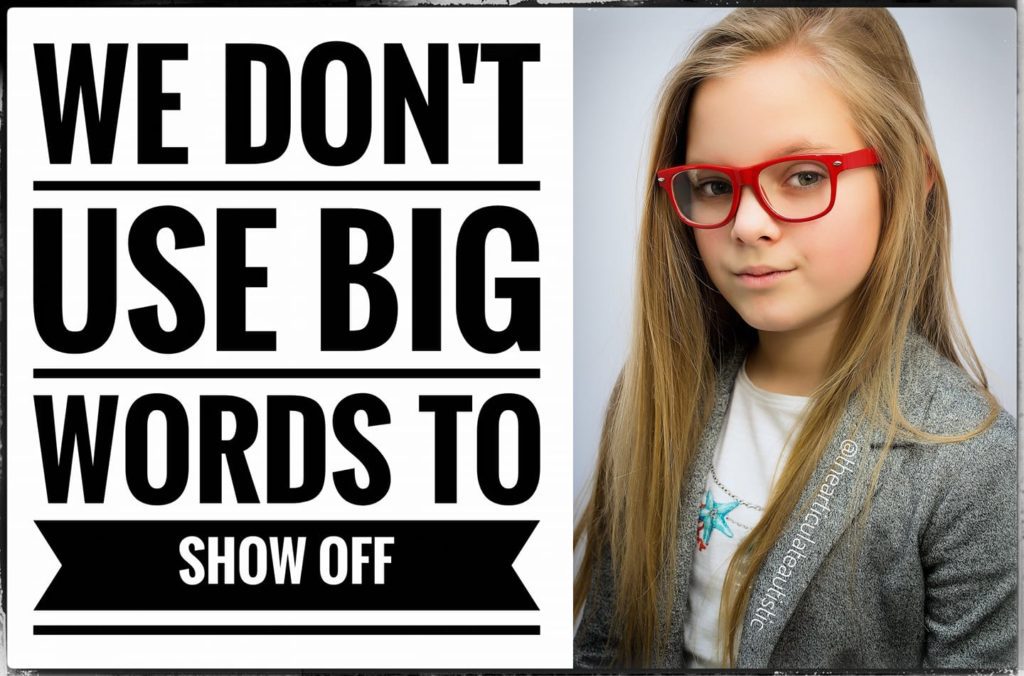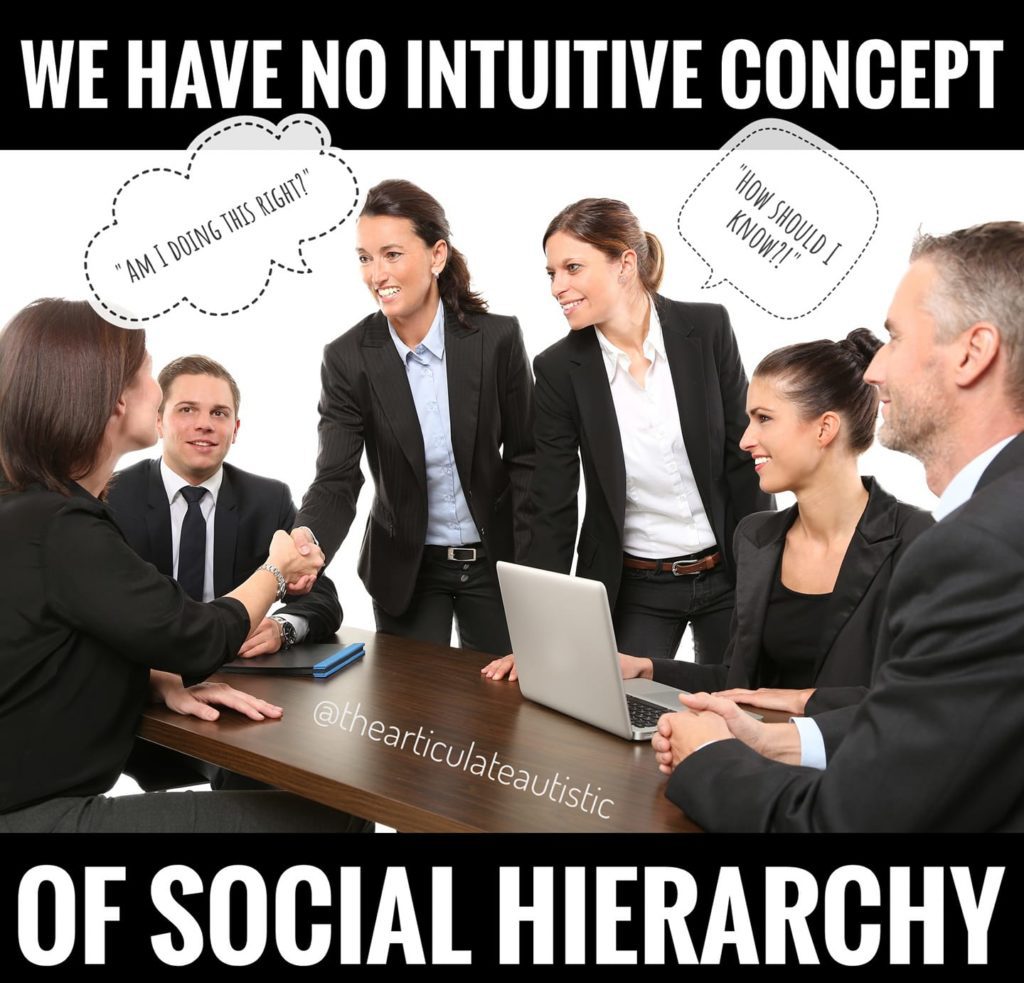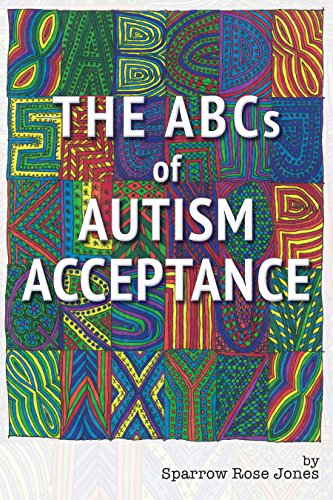We Don’t Use Big Words to Show Off

I don’t know how many autistic people this is a problem for, but I wanted to address it anyway.
I have always, since very early childhood, used big words. My vocabulary was both a blessing and a curse. It’s made me a great writer and helped me get through school when nothing else would have.
It also made me a laughing stock and a target by my peers. By the way, I never considered other children my “peers”. I never felt like a child, so I couldn’t identify with kids my own age at all, which certainly didn’t help matters.
But, the way I’m talking to you now? I’ve always talked this way. Blunt, direct, upfront, no concept of social hierarchy, totally on par with adults (good thing I am one now), and with all the college-level vocabulary you could shake a stick at.
Thing is, I don’t have a college degree. I’m not educated beyond some college classes. I don’t even know how or why I picked up my extensive vocabulary.
(Article continues below.)
The best way to improve communication with your autistic loved one is to understand how your autistic loved one’s mind works! Intentions, motivations, and personal expressions (facial expressions or lack thereof, body language, etc.), are often quite different in autistic people than they are in neurotypical people.
Experience a better understanding of your autistic loved one by reading books about life from an autistic perspective as well as stories that feature autistic characters. You’ll have so many “Ah ha!” moments and start seeing your autistic loved one in a different light (and you’ll have a better understanding of their behaviors, which you may have been misinterpreting up until now).
Books I recommend for a better understanding of your autistic loved one:
I was raised by my grandparents, and I read a lot, so that could account for some of the words and phrases I learned, but it mostly just came naturally to me.
I had absolutely no idea that I was speaking differently than anyone else, either. I couldn’t tell at all. I would just be mimicked, mocked, attacked, and ostracized, but nobody really explained why.
I do remember somebody asking me why I used big words all the time once, and I thought about it and said, “I don’t know the small words for the big words I use.”
And adults? Oh, yeah. They weren’t much better. They thought I was showing off and being rude and not knowing “my place”. I had no idea what any of that meant, either.
So, if you have a “little professor” in your life (what Hans Asperger called us ASD folks), we are just talking and trying to connect with you. Showing off or trying to be different is the furthest thing from our minds.
Follow me on Instagram.
Want downloadable, PDF-format copies of these blog posts to print and use with your loved ones or small class? Click here to become a Patreon supporter!








For me, reading was better than school. School was chaotic and confusing and, very often painful. I actually learned very little in school.
But … I read hundreds of books and kept them in the attic. Not because I wanted (or needed) to read them again, but because they’d taught me so much about people, language, and social expectations.
I’ll always be grateful to my father for buying me a set of encyclopedia. It filled in so many gaps.
Thanks for your comment, Brian. 🙂 I used to read the dictionary to understand what people were saying to me ALL the time!
>”I don’t know the small words for the big words I use.”
Some people have accused me of using a thesaurus to sound smarter, but what they don’t realize is that my real reason for consulting one is often to find a less obscure or pedantic-sounding word that flows better and alienates people less, not to try to make myself look better with more syllables. I have a strong desire to convey shades of meaning and nuance accurately, and this tends to call for rather specific terms that are usually rarer and longer (the natural trade-off of greater specificity) than the more general words that more easily give the impression that you don’t consider yourself above others.
Sometimes such a term and its nuance are, on reflection, not entirely necessary, and so it is that I’ve found myself using a thesaurus to edit something I’m writing so that, instead of saying something about having my words misconstrued (it isn’t a word that it’s hard to imagine someone using correctly on the fly, but just “big” enough that I’m optimistic it will paint the picture for others without giving anyone cause to suspect humblebragging), I’m saying something about being taken the wrong way. I expect this is rather the reverse of the typical use of a thesaurus.
There are two other reasons accounting for pretty much every time I’ve used a thesaurus:
1. There’s a particular word I know and want to use for a particular reason, but I’m drawing a blank at the moment (or I have a phonetically or conceptually similar word stuck in my mind that blocks recall). Some people might say that this means I don’t really know the word. This strikes me as so obtuse that I struggle to come up with a civil response at all.
2. I have a very specific shade of meaning I know I want to express and I want to survey the words that might apply to it so I can select the one with the connotation I’m going for (or, if you like, the intension that matches my intention).
2.1. (Oopsie, I cheated) I want to use it as a tool to narrow down what shade of meaning I’m actually trying to articulate (WordHippo, with its lists of “contexts” or senses in which a word is used, is great for this).
I do, of course, realize how ironic it is (or how likely it is to be perceived as such) that a comment about this subject should come across as verbose (overwrought?) as it probably seems to some — I guess it’s the right place for it, though.
It is absolutely the right place for it. Thank you for sharing. 🙂